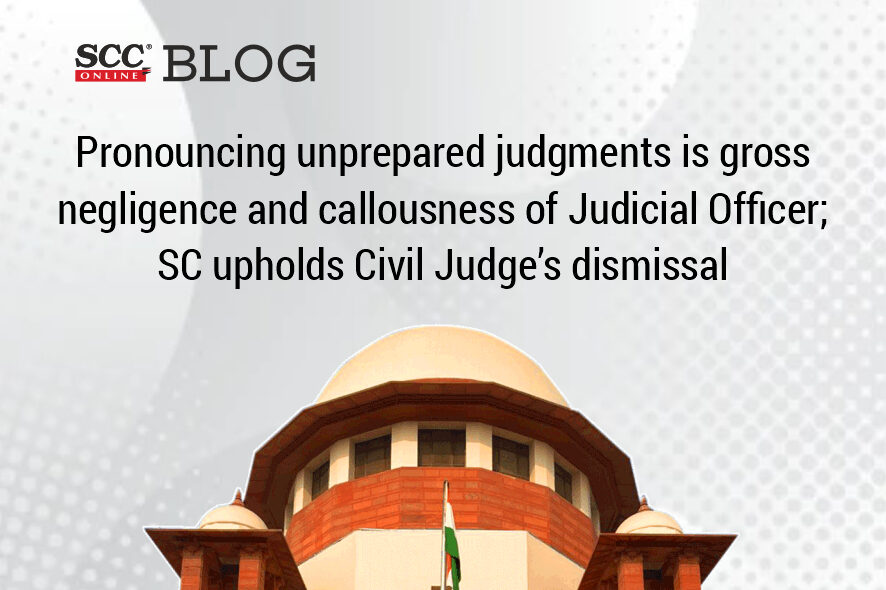Supreme Court: While hearing an appeal filed by the Registrar General of Karnataka (‘appellant’) challenging the order of the Karnataka High Court that set aside the penalty of dismissal from service of a Civil Judge (‘respondent’), the Division Bench of V. Ramasubramanian* and Pankaj Mithal set aside the impugned order of the High Court and upheld the penalty of dismissal imposed upon the respondent.
Factual Background:
In the matter at hand, the respondent was suspended on allegations of gross misconduct by an order dated 25-01-2005 followed by the initiation of disciplinary proceedings. The enquiry reports revealed some charges to be proved while other charges were not proved. Subsequently, the Full Court of High Court was resolved to impose the penalty for dismissal from service upon the respondent and based on the resolution of the High Court, an order of dismissal from service was passed by the Governor of Karnataka. Aggrieved by the findings of the enquiry officer, the respondent filed a set of three writ petitions challenging the order of dismissal from service, but all the writ petitions were dismissed.
Subsequently, the respondent filed four intra-court appeals, which were allowed by the Division Bench of the High Court and set aside the order of penalty along with the findings of the enquiry officer and directed that no further inquiry can be held against the respondent.
Being aggrieved by the decision of the High Court, the appellant filed civil appeals before the Supreme Court.
Supreme Court’s Analysis:
Whether the order of penalty of dismissal from service was justified qua the charges proved and whether the Division Bench of the High Court was right in setting aside the same?
The Court referred to the charges imposed upon the respondent and said that certain charges that revolve around pronouncement of operative portion of the judgment in open court without the whole text of the judgment being ready are serious in nature and the reply given to them by the respondent is wishy washy. The Court said that “a judicial officer cannot pronounce the concluding portion of his judgment in open court without the entire text of the judgment being prepared/dictated”. The Court said that the charges which revolve around gross negligence and callousness on the part of the respondent in not preparing/dictating judgments, but providing a fait accompli, was completely unacceptable and unbecoming of a judicial officer. Thus, the order of penalty of dismissal from service was completely justified.
Further, the Court said that the High Court did not test the correctness of the order of penalty in this case on the established parameters which the Court is obliged to follow while considering a challenge to an order of penalty imposed upon a judicial officer pursuant to the disciplinary proceedings followed by a resolution of the Full Court of the High Court, the parameters are namely:
1. whether the charges stood proved;
2. whether the findings of 12 the inquiry officer are reasonable and probable and not perverse;
3. whether the rules of procedure and the principles of natural justice have been followed; and,
4. whether the penalty is completely disproportionate, especially in the light of the gravity of the misconduct, his past record of service and any other extenuating circumstances.
The Court opined that High Court’s opinion in the impugned order that the acts of omission and commission attributed to the respondent do not constitute grave misconduct, is very-very curious. The Court called the High Court’s recordings -that dismissing the respondent from service itself is very atrocious, to be a “veiled attack on the Full Court of the High Court. The Court said that they were unable to conclude how the High Court went to the extent of certifying the respondent as an innocent and honest officer. Further, placing its reliance on Managing Director, ECIL v. B. Karunakar (II), 1994 Supp (2) SCC 391, the Court said that the High Court’s opinion that the second show cause notice issued to the respondent was in violation of the principles of natural justice was not factually and legally correct.
The Court pointed out that they have not come across a case where the High Court, while setting aside an order of penalty has held that there shall not be any further inquiry against the delinquent, but in this case, the High Court has done the same, creating a new jurisprudence.
Thus, the Court allowed the appeals and set aside the impugned order of the High Court.
[The Registrar General, High Court of Karnataka v. M. Narasimha Prasad, 2023 SCC OnLine SC 376, decided on 10-04-2023]
*Judgment Authored by: Justice V. Ramasubramanian







